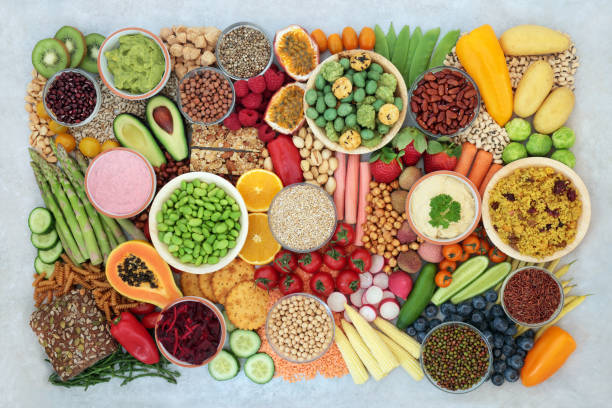Foods That Fight Aging: Your Guide to Younger-Looking Skin
Certain foods are packed with nutrients that support healthy, younger-looking skin. Antioxidant-rich fruits, leafy greens, nuts, and fatty fish can help reduce signs of aging by promoting hydration, elasticity, and protection from environmental stress.

Anti-Aging Foods for Radiant Skin: The Science Behind Nutrition
Antioxidant-rich foods form the foundation of any skin-healthy diet. Berries like blueberries, strawberries, and goji berries contain high levels of vitamins C and E, which protect skin cells from free radical damage. These compounds help maintain collagen production, the protein responsible for skin firmness and elasticity. Dark leafy greens such as spinach, kale, and Swiss chard provide folate, iron, and vitamin K, which support healthy blood circulation and give skin a natural glow. Sweet potatoes and carrots offer beta-carotene, which converts to vitamin A in your body and helps repair skin tissue while providing natural sun protection.
Foods That Help Skin Look Younger Naturally Through Hydration
Proper hydration goes beyond drinking water; certain foods provide deep cellular moisture that reflects in your skin’s appearance. Cucumber contains silica, a compound that supports connective tissue health and maintains skin moisture. Watermelon provides lycopene and high water content, helping to plump skin cells from within. Avocados deliver healthy monounsaturated fats and vitamin E, which strengthen the skin barrier and lock in moisture. Tomatoes contain lycopene, a powerful antioxidant that becomes more bioavailable when cooked, offering protection against UV damage while supporting skin hydration. Green tea provides polyphenols that reduce inflammation and support skin cell regeneration.
Skin-Boosting Foods for Anti-Aging: Protein and Healthy Fats
Fatty fish like salmon, mackerel, and sardines provide omega-3 fatty acids that reduce inflammation and maintain skin suppleness. These healthy fats help strengthen cell membranes, keeping skin smooth and reducing the appearance of fine lines. Nuts and seeds, particularly walnuts, almonds, and sunflower seeds, offer vitamin E, zinc, and selenium. These minerals support collagen synthesis and protect against oxidative stress. Greek yogurt contains probiotics that support gut health, which directly impacts skin clarity and reduces inflammation-related aging signs. Eggs provide high-quality protein and biotin, essential for skin cell regeneration and maintaining a healthy complexion.
The Role of Antioxidants in Natural Anti-Aging
Dark chocolate with at least 70% cacao content contains flavonoids that improve blood flow to the skin and protect against sun damage. Red grapes and pomegranates provide resveratrol and punicalagins, compounds that activate longevity genes and reduce cellular aging. Broccoli and Brussels sprouts contain sulforaphane, which supports the body’s natural detoxification processes and protects skin cells from environmental toxins. Green leafy herbs like parsley and cilantro provide chlorophyll and vitamin C, supporting collagen production and giving skin a healthy, youthful appearance.
Building Your Anti-Aging Meal Plan
Creating a sustainable anti-aging diet involves incorporating these foods into regular meals rather than viewing them as supplements. Start your day with a berry and spinach smoothie, add avocado to your lunch salad, snack on nuts and seeds, and include fatty fish in your dinner rotation twice weekly. The Mediterranean diet naturally includes many of these anti-aging foods and has been associated with healthier, more youthful-looking skin. Focus on whole, unprocessed foods while limiting sugar, refined carbohydrates, and excessive alcohol, which can accelerate skin aging through inflammation and glycation processes.
| Food Category | Examples | Key Anti-Aging Benefits | Daily Serving Recommendation |
|---|---|---|---|
| Antioxidant Fruits | Blueberries, Pomegranates | Collagen protection, Free radical defense | 1-2 cups |
| Fatty Fish | Salmon, Mackerel | Omega-3s, Inflammation reduction | 2-3 servings per week |
| Leafy Greens | Spinach, Kale | Vitamin K, Folate, Iron | 2-3 cups |
| Nuts and Seeds | Walnuts, Sunflower seeds | Vitamin E, Healthy fats | 1 ounce (handful) |
Maximizing Results Through Consistent Nutrition
The benefits of anti-aging foods become apparent with consistent consumption over time rather than sporadic eating. Research suggests that visible improvements in skin texture, hydration, and overall appearance typically occur after 8-12 weeks of maintaining a nutrient-rich diet. Combining these foods with adequate sleep, regular exercise, and proper skincare enhances their anti-aging effects. Remember that genetics, sun exposure, and lifestyle factors also influence how your skin ages, but nutrition provides a powerful tool for supporting your skin’s natural repair and renewal processes.
Incorporating anti-aging foods into your diet represents a natural, science-backed approach to maintaining youthful-looking skin. These nutritional powerhouses work from the inside out, providing your skin with the building blocks it needs to stay healthy, hydrated, and resilient against environmental stressors. While no single food can stop the aging process, a consistent diet rich in antioxidants, healthy fats, and skin-supporting nutrients can significantly impact how gracefully your skin ages over time.
This article is for informational purposes only and should not be considered medical advice. Please consult a qualified healthcare professional for personalized guidance and treatment.




